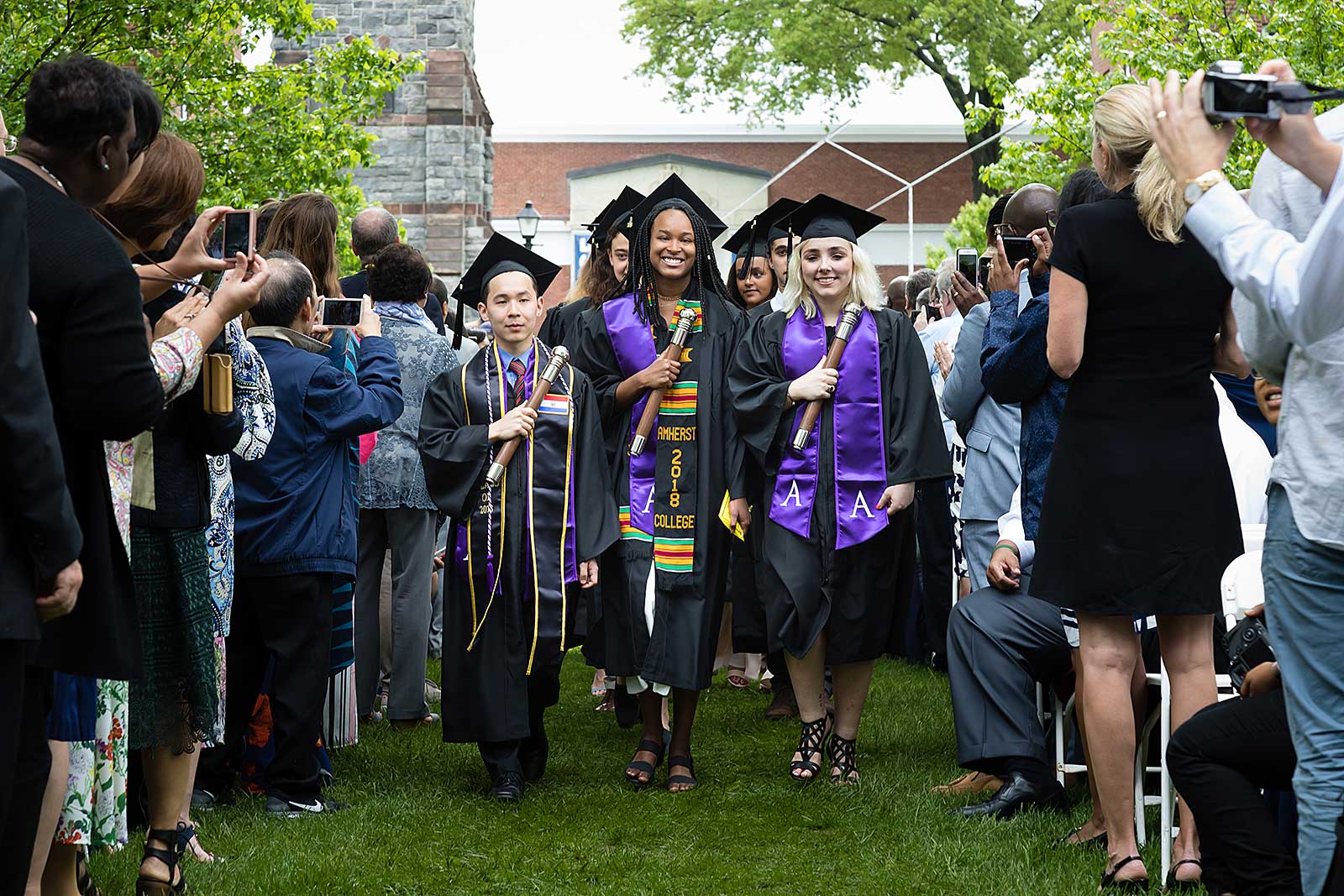
In a Commencement speech full of references to literature, song and political theory, Amherst President Biddy Martin today encouraged the College’s class of 2018 to “bring a poetic approach to politics.”
An estimated 5,000 family members and friends converged on the College’s Main Quad to cheer for the seniors as they received their bachelor of arts degrees and to hear Martin’s words of encouragement. The event also featured an address by student speaker Noor Qasim ’18, the awarding of six honorary doctorates and performances by the Choral Society. It concluded a weekend of lectures, concerts and other festivities. (Audio of talks given by the honorees and photos from the weekend are posted on the Commencement website. )
When it came to the weather, this year’s exercises were more dramatic than most. The threat of thunderstorms prompted an 11th-hour rearrangement of the program, in which President Martin announced she’d forego her Commencement address to make sure every graduate could walk across the stage. The speech would follow if the rain didn’t, she said, and indeed, during the awarding of degrees, the skies cleared and the sun peeked out.
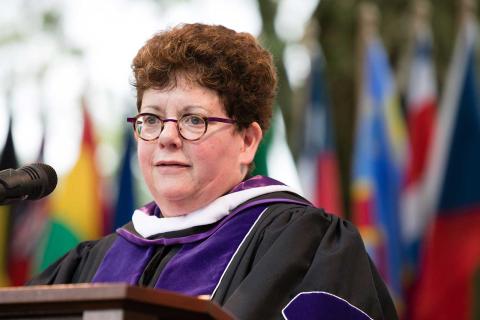
Martin started her address with a quote from a speech delivered by President John F. Kennedy at Amherst College in October 1963.
“When power leads men towards arrogance, poetry reminds him of his limitations,” she said, quoting Kennedy. “When power narrows the areas of man’s concern, poetry reminds him of the richness and diversity of his existence. When power corrupts, poetry cleanses. For art establishes the basic human truth which must serve as the touchstone of our judgment.”
Those remarks had served as a central theme for a fall 2017 Amherst symposium in celebration of what would have been Kennedy’s 100th birthday, Martin explained. She said that Kennedy’s speech inspired much discussion among the students, faculty, staff and alumni at the symposium, including Qasim.
As Martin recalled, both Qasim and another graduating senior who took part in the symposium, Dakota Foster ’18, were moved by the language of the speech and the hope it inspired. They also wondered about sources of hope today.
Martin suggested that we acknowledge the realities we face, look them in the eye and do what Kennedy consistently urged. In her words, that means accepting “our responsibilities as citizens to engage in the political process—however slow and arduous it is—in a way that is guided by principles, informed by evidence and committed to the democratic process.”
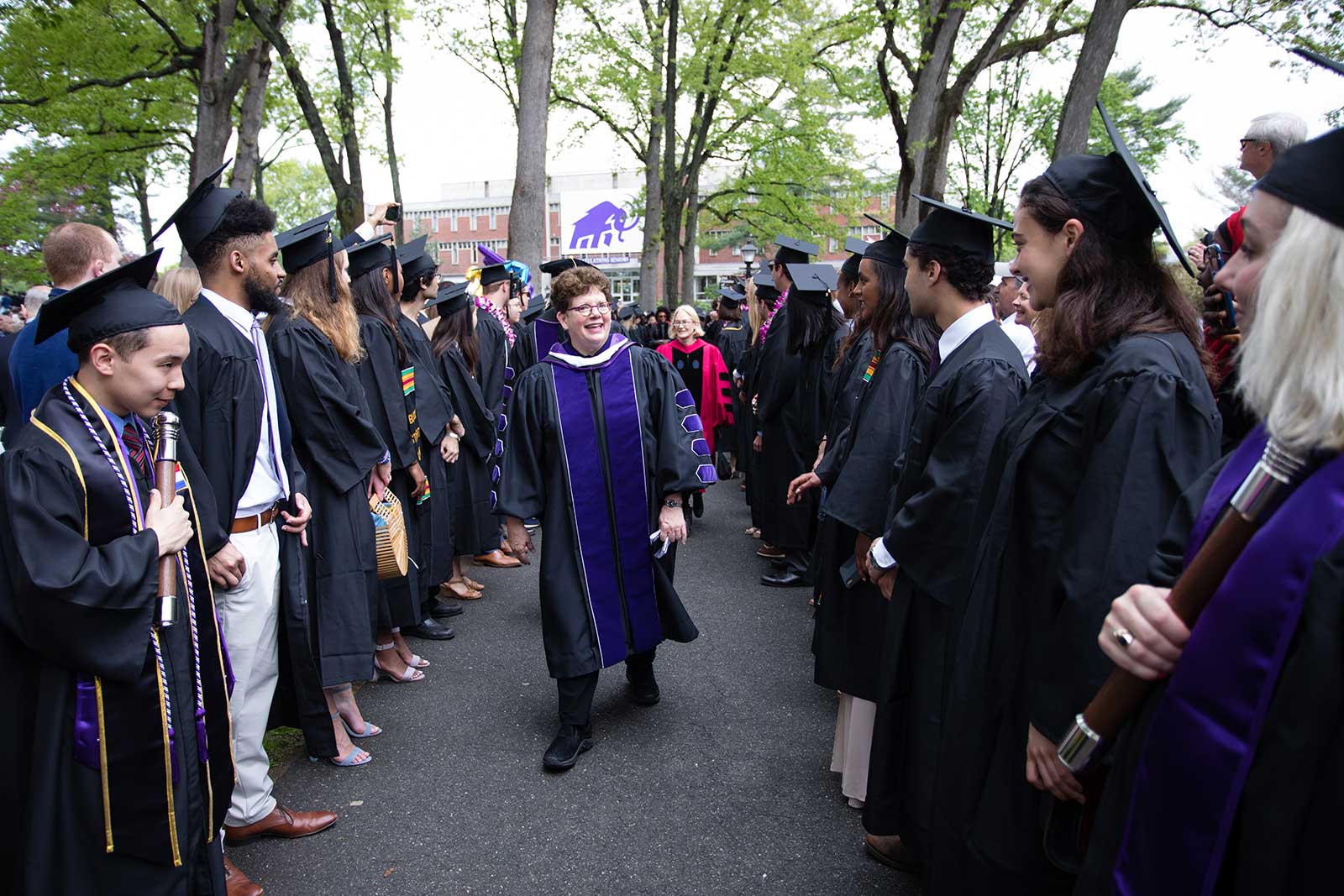
Referencing Hélène Cixous, Martin described the Algerian-French writer’s approach to “the political and the poetic.”
“At the heart of poetic practice is a use of language that discloses, rather than erases the other,” Martin said. “The liberal arts, including not only the arts and humanities but also the sciences and social sciences, open a space for our exploration and attentiveness to basic human truths so we can make common cause.”
Attentiveness characterizes the work of poet and Amherst teacher Richard Wilbur ’42, said Martin. She read Wilbur’s “A Measuring Worm,” a poem that, as she described it, captures the uncertainties of life and the hope in transformation. “I hope you will fly as high and as far as monarch butterflies,” she told the graduates. Quoting from the musician Leonard Cohen’s song “Anthem,” she encouraged them to avoid cynicism and perfectionism, to accept that “there is a crack in everything” and to embrace the difference their lives can make in the world.
Prior to reading A.R. Ammons’ “Salute,” which she shares with every graduating class, Martin wrapped with a charge to the graduates: “Let the poetic be your guide as you pursue solidarity and co-extensiveness” with other people and the natural world.
“Truth matters,” she said. “Language matters. You matter.”
Senior Speaker Qasim: “Joy and Sadness are Next-door Neighbors”
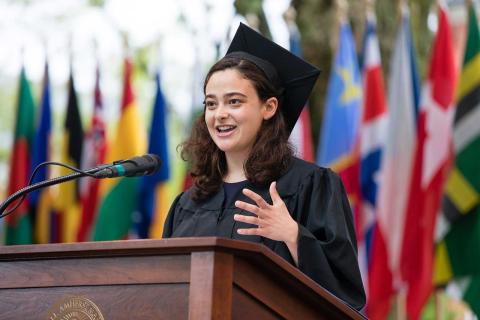
Qasim started by disclosing what she said her friends know well, that she is “a crier.” She has cried on every floor of Frost Library and in every room in Valentine Dining Hall, she said, and would probably cry when she exited the stage.
“I thought about just coming up here and crying for 10 minutes straight like a performance piece, but I know that’s not really what we’re going for,” she joked. “We’re graduating! Our futures twinkle like stars!”
“But if this difficult semester has made anything clear,” Qasim continued—a likely reference to the deaths of two students, Andrew Dorogi ’18 and Christopher Collins ’20—“it is that joy and sadness are next-door neighbors.”
After sharing anecdotes about sobbing with and on the shoulders of classmates, she noted what she described as the strangeness of giving a commencement speech about crying—and about the strangeness of graduation in general. She said it reminded her of passage from author Marilynne Robinson’s book Housekeeping that ended with, “She saw her daughters’ faces not as they always were, or as other people’s were, and she was quiet and aloof and watchful, not to startle the strangeness away.”
“Graduations are not really the time to be ‘quiet, aloof and watchful,’” Qasim said. “This is the time for cheering and for songs and jokes and for us to march forth into the future with our bigger brains and broader hearts and change the world—or work at Goldman.”
“Yet the earth and the sky and the people around us are not as they always are. This is a big day.”
She ended her speech with a recollection of “blubbering” with a friend after last year’s Commencement. They had watched several of their friends say goodbye to one another and it had reduced them both to tears.
“What’s so funny about today, and these past few weeks is that I don’t really feel like blubbering. There just isn’t time. We have places to be, planes to catch. Our lives are changing today and they will change tomorrow. I know that, while I have cried so many times, very often, one of you has been there with me. And that even when there wasn’t [one of you there], I have felt, accompanying those tears, a strange and ecstatic sort of joy. To be in this place, with all of you, just trying to figure things out.”
Honorary Awards and Other Prizes
In addition to the conferring of bachelor of arts degrees on the assembled graduates, honorary doctorates were presented to six leaders:
- Acclaimed Nigerian writer and feminist icon Chimamanda Ngozi Adichie
- Classicist and political philosopher Danielle Allen, the James Bryant Conant University Professor at Harvard University and director of Harvard’s Edmond J. Safra Center for Ethics
- Civil rights activist Morris Dees, co-founder and chief trial counsel for the Southern Poverty Law Center
- Environmental security advocate Sherri Goodman ’81, senior fellow at the Woodrow Wilson Center’s Environmental Change and Security Program and Polar Initiative and former U.S. Deputy Undersecretary of Defense (Environmental Security)
- Art historian and curator Kellie Jones ’81, professor at Columbia University and a 2016 winner of a MacArthur Foundation Fellowship
- Children’s health advocate Philip J. Landrigan, professor of environmental medicine and pediatrics and dean for global health at Mount Sinai’s Icahn School of Medicine
Other honorees included Peter A. Nadosy P’01, who was awarded the 2018 Medal for Eminent Service “for exceptional and distinguished service to the College for a great period of time.”
Teachers Jeffrey Cramer, a retired physics teacher at Henry W. Grady High School in Atlanta; Charles H. Frankenbach III, an English teacher at the Hotchkiss School in Lakeville, Conn.; and Barbara A. Gribbins-Krollage, an English teacher at West Islip (N.Y.) High School, were honored with Phebe and Zephaniah Swift Moore Awards after being nominated by graduating seniors whom they had taught in high school.
Emily Stern ’83 P’18 served as the honorary marshal for the ceremonies.
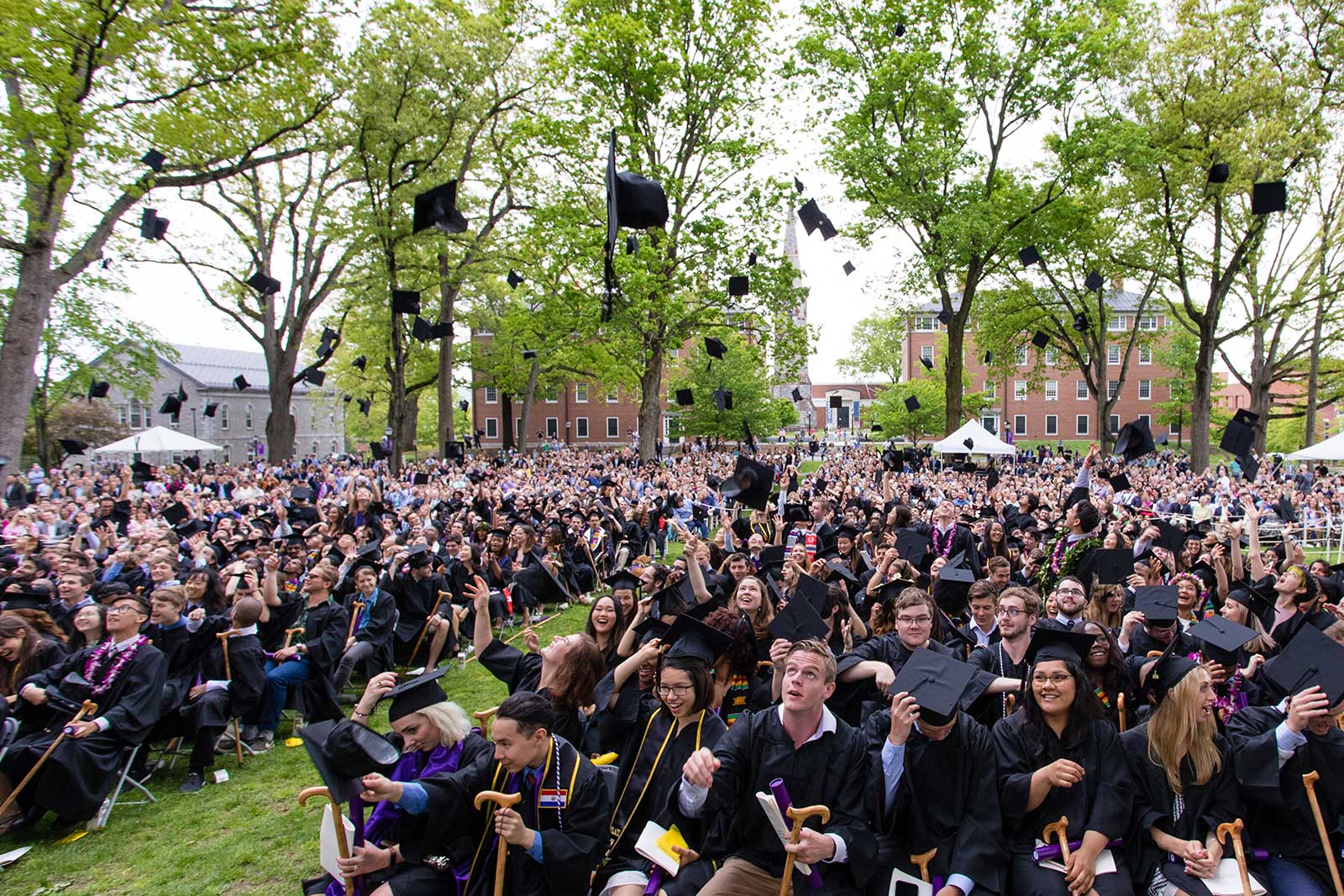
The Obed Finch Slingerland Memorial Prize, given by the trustees of the College to members of the senior class who have shown “by their own determination and accomplishment the greatest appreciation of and desire for a college education,” was awarded to two students, Aditi Krishnamurthy ’18 of Mumbai, India, and Itai Muzhingi ’18 of Harare, Zimbabwe.
The Woods-Travis Prize, an annual gift in memory of Josiah B. Woods and Charles B. Travis of the class of 1864, was awarded for “outstanding excellence in culture and faithfulness to duty as a scholar.” It went this year to five members of the class of ’18: Jonathan Che of Acton, Mass.; Alexander John Eftin Frenett of Rochester, N.Y.; Galen Fulton Muskat of Center Sandwich, N.H.; Minato Sakamoto of Ashiya City, Japan; and William John Wesley of Pittsford, N.Y.

